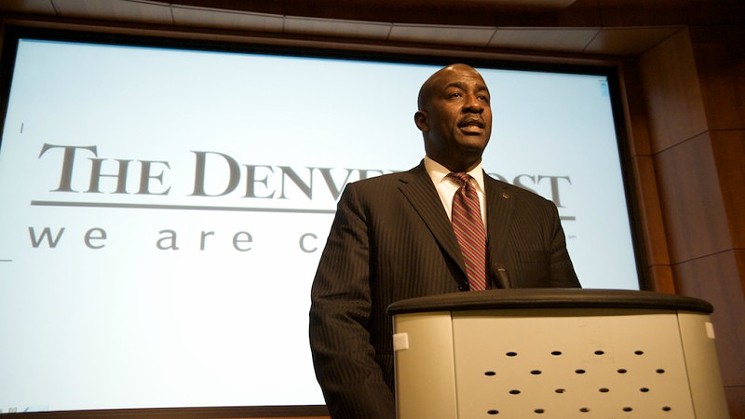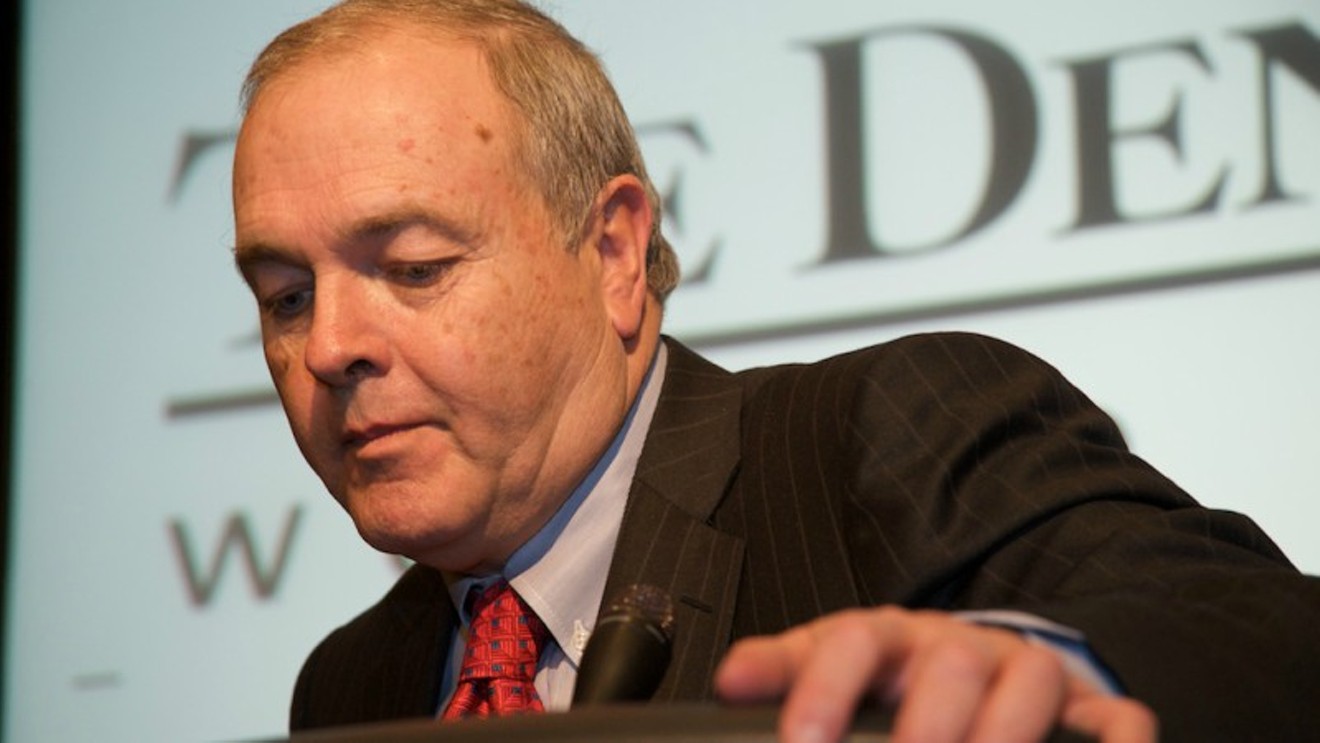"They've killed a great newspaper," Singleton says.
Singleton's departure, as well as that of two other senior editors, Dana Coffield and Larry Ryckman, followed the May 3 resignation of Post editorial-page editor Chuck Plunkett, who stepped down after Digital First Media chief operating officer Guy Gilmore rejected an editorial critical of Alden. (Plunkett had managed to get another series of attacks on Alden into print a few weeks earlier in part because the Post is currently without a publisher following Mac Tully's January resignation.)
When asked if this series of events constituted the last straw, Singleton jokes that with Plunkett gone, he would have been the only person left on the board, and he didn't want to spend all of his time writing editorials. But this remark is the sole flash of humor as Singleton discusses the Alden-dictated slashes that have reduced the Post to a shadow of its former self.
Once upon a time, Singleton detractors referred to him as "Lean Dean" because he tended to downsize at newspapers he purchased in an effort to reduce what he saw as fat and increase efficiencies. But no one ever doubted his passion for journalism. As he puts it, "I love newspapers. I love news" — and that's one reason the Post had an editorial staff that employed 310 people just over a decade ago, in contrast to the seventy or fewer left today. Moreover, he says he found it increasingly uncomfortable when out and about at community events when Post readers would ask him about the paper's decline. After informing them that he had nothing to do with day-to-day operations at this point, "They'd say, 'But your name's still on there.'"
It isn't anymore, for the first time in more than a generation. In the following Q&A, Singleton offers more insight into why — and he doesn't pull any punches.

Dean Singleton in his Denver Post office circa 2001, when we profiled him in the cover story "Press for Success."
File photo
Dean Singleton: I called Guy Gilmore on Thursday night to tell him I thought it was time I stepped down.
How did he respond?
He asked me to think about it — to think about it before I did it. I said, "I'll think about it, but I really want to do it. It's time."
I have total disagreement with how they're managing the place, but I'm not going to stand up and be overly critical of them. They've got the keys to the car and they can drive it any way they want to. But they're not driving it in a way that I want to be a passenger of the car.
We took the Sunday paper to the fifth-largest in the country and won some Pulitzers, and we were very proud of what we did. When the newspaper model began to change in 2006-2007, we began to cut back like everybody else had to. But still we maintained a staff that could do prize-winning reporting.
In 2010, the year after the Rocky [Mountain News] closed, we had 379,000 print daily newspapers and 550,000 print Sunday newspapers. My understanding is that daily is below 100,000 now and Sunday is below 200,000. And when you continue to dramatically increase circulation pricing while you dramatically decrease the amount of news in the newspaper, that's not a winning strategy. It can give you two or three years of good cash flow, but it's not a winning strategy, and it's not one you can be proud of. If you live in New York and you never come to Denver, you don't really need to be proud of it. But if you live here, you need to be proud of it.
Denver Post journalists, the Denver Post newspaper guild and others in the community have been lobbying for Alden to sell the paper. Do you see that as a realistic possibility?
I see very little hope that Alden will sell the Denver Post. It's the core newspaper for MediaNews. [The firm owns a dozen other publications in Colorado, including the Boulder Daily Camera.] It's a very important part of keeping Digital First together. There certainly would be tax complications and corporate overhead complications, and for now, the Post throws off a lot of cash. So I don't see any interest in their part to sell. That could change someday, but I don't see any prospect that's going to happen.
Clearly, someone of your stature stepping down, and all the other attendant resignations that have happened over the past few days, suggests negative PR for Digital First Media and Alden Global Capital. Do you think that will have any significant impact when it comes to the possibility of them actually considering a sale?
I don't know. I haven't had that conversation. I understand the business reasons why Alden would not want to sell the Denver Post. There are a lot of business reasons why it doesn't make a lot of sense for them to sell unless they sold the whole company, and that doesn't appear to be on the horizon. I'm not going to say anything bad about Alden, publicly or privately. I don't know that they understand how damaging they've been to the newspaper and how damaged the newspaper is in the local community.
What kind of negative impact has not having a strong Denver Post had on the community over the past couple of years?
I think the Post, right up until recently, has maintained a solid, strong editorial voice. Chuck did an outstanding job. The Post had strong editorial positions on every issue. Even when it got down close to 100 people, they couldn't cover all the things they once covered, but they did a pretty good job of covering what they did cover. But in one day, two Broncos beat reporters left. The Post had a lot of talent — a lot of talent. And it's going out the door rapidly.
We always said in a newspaper, your only asset goes up and down the elevator every day. When you get down to below seventy people covering a market this size, you just can't do it very well. The people still there do an outstanding job with the resources they have, but I don't know that there's anybody there that's not trying to get out. I don't think anybody wants to be there.
On the subject of resources, Denver's police chief, Robert White, said at a public meeting on a Friday that he was going to resign. That's the kind of meeting the Denver Post, when it was fully staffed, would definitely have assigned someone to cover. But the news didn't break until early the next week simply because the Denver Post didn't have enough manpower to allow someone to be there. Is that an example of what you're talking about?
That is an example. We didn't have 310 people for very long. We got there just before the newspaper model began to change rapidly, so we went down pretty fast. But a week before the Rocky went out of business, there were 450 people covering news in Denver for print newspapers. The Post had 230 and the Rocky had 220. So that was 450 people watching over the government and doing news. And now it's 65, maybe. It takes half of that just to process stories and lay them out and things like that. It's just not doable.

Former Denver Post editor Greg Moore at the 2009 Rocky Mountain News closure press conference.
Photo by J. Knight
A lot of this is unavoidable. Whether you look at Gannett or McClatchy or Lee or you name the company, reducing staff is unavoidable. But gutting it like has happened at the Post is unnecessary. You saw Ken Doctor's numbers on how much the place made last year [in a Nieman Lab piece last week, journalist Doctor reported that Digital First Media's Colorado properties earned $36 million in fiscal year 2017]. When you're making that kind of money, you don't need to cut as rapidly as they have.
I get the sense that you're not talking about your disappointment from a nostalgic or sentimental standpoint, but more from the perspective of the paper's mission being unfulfilled. Am I on the right track about that?
Yes. You can't be nostalgic. You're never going to go back to where you had both the Rocky and the Post. You're never going to go back to those times, because the world has changed. It's not nostalgic at all. It's just that the Post has been crippled. It is crippled. The heart and soul of the newspaper — in fact, the heart and soul of the community — is the editorial page of the local newspaper. And the Post doesn't have one.
To me, it's unbelievable that somebody would be so naive as to believe you can cut the heart out of a newspaper and still think it's going to survive. Because you can't. I have little hope that the Post has a lot of future.
Is there anything I might not have asked about that you'd like to add?
There's probably nobody you could talk to at the Post who wouldn't give you a similar opinion. It's sad. It's like watching your mother or father go into hospice. This became a very good newspaper, and it became the heart of the state of Colorado, and they've cut the heart out of it.












